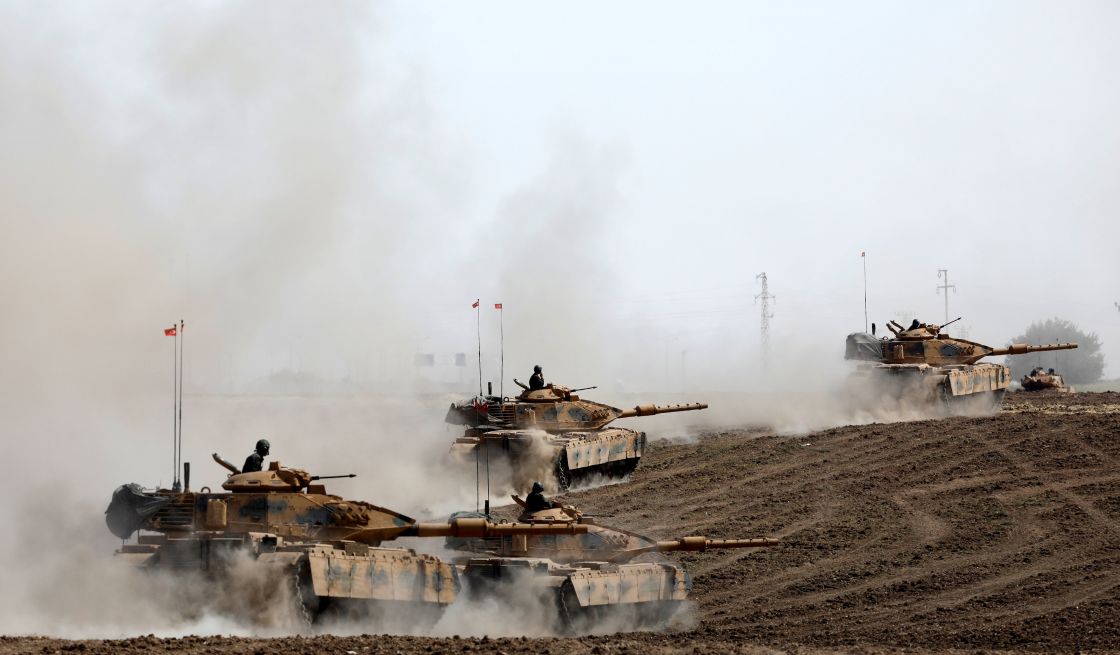- Editorials
- Posted
Kassioun Editorial 1098: Preventing Aggression is Syrians’ Responsibility
The new catastrophes that befall Syrians wherever they are, including the possibility of a new Turkish ground aggression these days, prove that every additional day of delay in implementing a comprehensive political solution through the full implementation of UNSC Resolution 2254 is an additional deepening of the crisis and the humanitarian and national catastrophe, and that the de facto division and with it the ceasefire are a fragile reality that could fall apart and explode at the slightest friction. Not to mention that any of the Syrian regions today, in the absence of a comprehensive political solution and the absence of comprehensive national sovereignty based on consensus and unity of the people and their interests, is the subject of polarization and confliction of international and regional interests, which makes matters more difficult, dangerous, and complicated. All this means that the most urgent priority in the comprehensive national sense was, and still is, represented in moving quickly towards a comprehensive political solution through the full implementation of UNSC Resolution 2254.
Regarding the old-new issue of the possibility of a new Turkish ground aggression on areas in norther and northeaster Syria, the Turkish authorities continue to exaggerate portraying the threat of SDF/SDC against them, for complex objectives that include internal and external ones. Undoubtedly, in this context, the Astana track is required to work as much as it can to prevent the possibility of aggression, and to push for the full implementation of the Sochi agreements, not only in the northeast, but also in the northwest. Of course, any sane person can only expect the Americans to ignite the fire and fuel it as much as they can. This was evident in their ambiguous and contradictory statements issued by the White House and the Pentagon, one of which supported a Turkish military operation, and the other opposed it.
Nevertheless, the primary responsibility in preventing the Turkish aggression rests primarily with the Syrian forces, before any foreign force. Confronting this responsibility will be by blocking Turkish pretexts, and through consensus among the Syrian forces.
This consensus requires not only continuing the dialogue between Damascus and SDF, but also requires cessation of illogically raising the ceiling of mutual demands. Among the most important entry points for reaching actual consensus are the following:
First: The borders should be handed over to the Syrian army; this would hinder Turkey’s ability to breach them. This would be achieved through consensus that the Astana track helps in guaranteeing.
Second: The issue of agreeing on how to administer regions in the northeast should be postponed to a later stage, not only because the two negotiating sides do not alone have the full right to decide how to administer these regions, but also because the matter of what this administration looks like should be the product of a general Syrian consensus in which all Syrian forces participate.
Third: What has obstructed and is still obstructing consensus, in addition to the high demand ceilings, is that the dialogue is not fully inclusive, as it is a dialogue between two Syrian sides that do not include other relevant sides concerned with determining their destiny and the destiny of Syria, including the required developed formula for the relationship between centralization and decentralization.
Fourth: Due to the high complexity and entanglement in the relevant area, the search should focus on creative solutions that ensure the separation of all the feuding forces from each other in a way that guarantees there is no direct friction among them and in a way that guarantees Syrian national sovereignty. This is something that can be reached if there is a patriotic will therefor.
These partial mechanisms can prevent the expected aggression only if they are carried out quickly, and only if they are part of a complete system of solutions, all of which contribute together to the comprehensive and full implementation of UNSC Resolution 2254.


